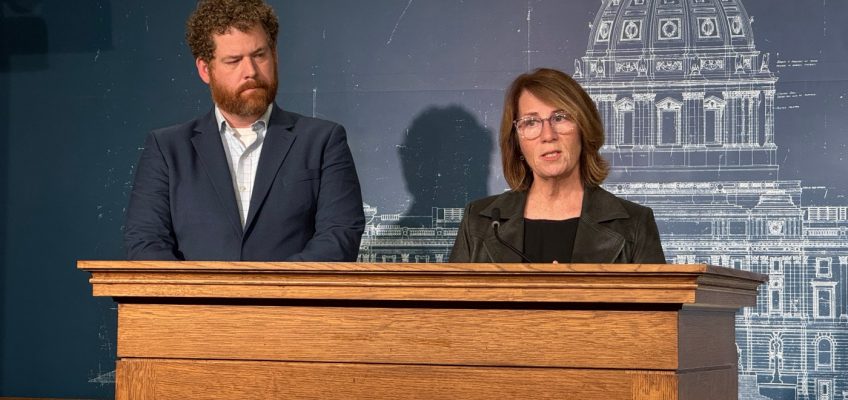Minnesota Democrats on Tuesday released a plan for a special legislative session on gun control and school safety that calls for lawmakers to return to the state Capitol early next week.
The framework signed by Gov. Tim Walz and Democratic-Farmer-Labor legislative leaders includes a ban on so-called assault weapons, funding boosts for school security and mental health services, and increased criminal penalties for firearm offenses.
Walz would call lawmakers back to St. Paul on Oct. 6 to pass a mixture of proposals floated by both DFLers and Republicans in the wake of the shooting at Annunciation Catholic Church in Minneapolis last month, which took the lives of two children and injured 21 others.
Republican leaders didn’t sign on to the framework and continue to resist DFL pressure to create new gun control laws. No bills can reach the governor’s desk without bipartisan support in Minnesota’s narrowly divided Legislature, where the House is tied 67-67, and there is a one-seat DFL majority in the Senate.
“I think Minnesotans have the answer that they’ve been looking for about what the Republican position is on guns,” said House Democratic Leader Zack Stephenson, DFL-Coon Rapids. “They’re not even willing to have a vote on the floor on the merits of these very important issues and that’s deeply disappointing to me.”
GOP: No pre-session deal
House Floor Leader Rep. Harry Niska, R-Ramsey, told reporters Tuesday that he did not believe any GOP members would back bills like a ban on semiautomatic rifles or magazine capacity limits. In a statement, Niska called the DFL framework “a pathetic attempt to engineer a predetermined outcome.”
House Speaker Lisa Demuth. (John Autey / Pioneer Press)
Niska and House Speaker Lisa Demuth, R-Cold Spring, said any bills that ended up passing in a special session should go through a public hearing process and shouldn’t be the product of a “backroom” pre-session deal negotiated behind closed doors. Niska accused Walz of “political posturing.”
“Republicans have made clear that we’re open to serious bipartisan solutions when it comes to school safety, when it comes to public safety, when it comes to mental health,” Niska told reporters Tuesday. “And now it’s clear that the governor really isn’t interested in that; he’s really just interested in trying to politicize a really horrible tragedy.”
DFLers announced their special session framework early Tuesday afternoon after a brief meeting with GOP leaders and the governor.
Stephenson said he was “discouraged” by the lack of agreement after nearly a month of talks, but remained committed to pushing on GOP members for votes on gun control. Demuth said she didn’t think talks had necessarily “broken down” and said she believed there was still room for future discussions.
Senate Majority Leader Erin Murphy, DFL-St. Paul, said it became apparent in the meeting that they had reached an “impasse,” but that discussions hadn’t completely broken down.
“No one has said we wouldn’t go back to the table,” she said.
Little progress
Earlier in September, Walz said he would call a special session on guns “one way or another” even as it became apparent that the odds were low that any significant gun control bills would make it through the Legislature.
Two public Senate hearings earlier in the month did little to bring DFLers and Republicans any closer together on the issue.
Republicans have said they do not oppose a special session, but have remained unified in their opposition to gun restrictions and have instead floated proposals related to mental health and school security.
However, Republicans aren’t the only obstacle to major gun legislation. It’s also unclear if DFLers have enough votes in the Senate.
DFL senators from rural districts have resisted gun control bills in the past, including Judy Seeberger of Afton, Grant Hauschild of Hermantown and Rob Kupec of Moorhead. When the DFL controlled the Senate, House and governor’s office in 2023 and 2024, they did not pass a ban on assault weapons — semiautomatic rifles with features like pistol grips and detachable magazines.
Murphy couldn’t say whether she had enough votes to pass a bill like an assault weapons ban and acknowledged that it would be a “hard vote.”
“My colleagues are working very hard to understand how they will vote when this issue comes before them,” she said. “And, I’m counting my votes, and I will let you know. But no one has said ‘hell no.’”
Previous gun laws
In 2024, Minnesota enacted two major gun control laws passed by the DFL-controlled Legislature.
One created extreme risk protection orders, where family members and law enforcement can petition a court to remove firearms from an individual deemed an immediate threat to themselves or others. The other created universal background checks for firearms sales.
Courts also tossed some Minnesota gun laws this year.
Gun rights groups won their legal battle to reduce the minimum age to obtain a permit to carry a gun to 18 and overturned a state ban on binary triggers — a modification that can greatly increase a semiautomatic weapon’s rate of fire by allowing it to shoot both when the trigger is pulled and released. The state has appealed the decision.
In another ruling, the Minnesota Supreme Court said a decades-old law banning certain guns without serial numbers didn’t apply to homemade “ghost guns” as long as federal law doesn’t require a serial number.
DFLers as part of their special session framework, want to address the ghost gun loophole and pass another binary trigger ban.
Joe Soucheray: Trump had nothing to do with fraud in Minnesota. That’s on the governor.
Gov. Walz: GOP won’t budge on gun control; House speaker calls it ‘mischaracterization’
Former DFL lawmaker Nicole Mitchell sentenced to 6 months in jail for burglary
Why did two firefighters walk from Duluth to St. Paul? This is their story.
Letters: If Hamas cared about civilians at all it would release the hostages




